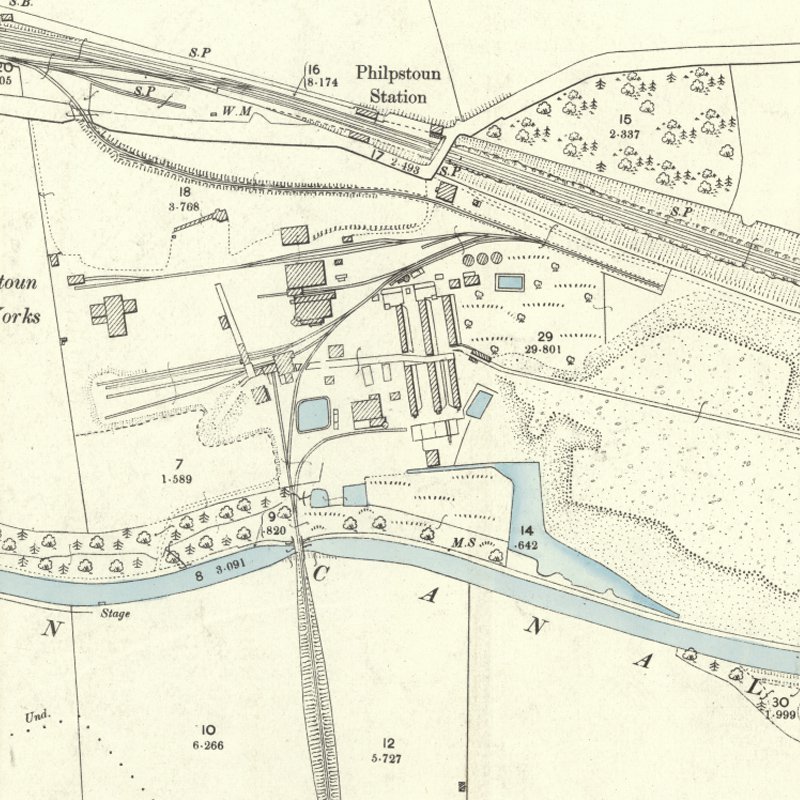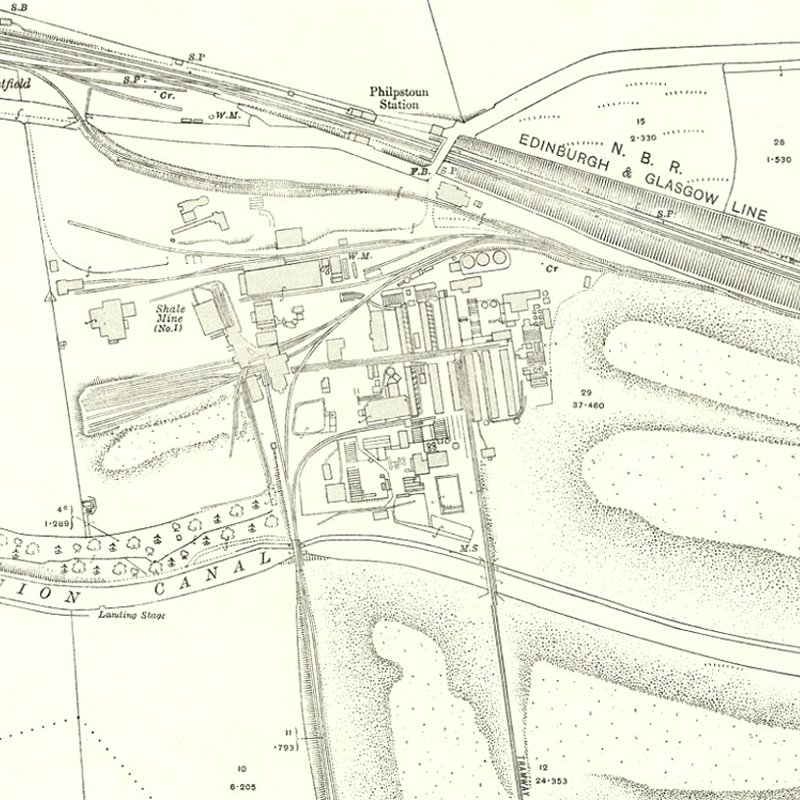- Aberdeen Oil Works
- Addiewell Oil Works
- Almondhill Oil Works
- Annick Lodge Oil Works
- Arden Oil Works
- Armadale Oil Works
- Auchenheath Oil Works
- Avonhead Oil Works
- Balgray Oil Works
- Ballat Oil Works
- Bathgate Oil Works
- Bathville Oil Works
- Bellsdyke Oil Works
- Bellsquarry Oil Works
- Benhar Oil Works
- Binnend Oil Works
- Birkenshaw Oil Works
- Bishop Street Oil Works
- Blackburn Oil Works
- Blackstone Oil Works
- Blackstoun Oil Works
- Blochairn Oil Works
- Boghall Oil Works
- Bredisholm Oil Works
- Breich Oil Works
- British Asphalte Oil Works
- Broxburn Oil Works
- Broxburn - Bell's Stewartfield Oil Works
- Broxburn - Albyn Oil Works
- Broxburn - East Mains Oil Works
- Broxburn - Greendykes Oil Works
- Broxburn - Hallfarm Oil Works
- Broxburn - Hutchinson's Oil Works
- Broxburn - Poynter's Oil Works
- Broxburn - Steele's Oil Works
- Broxburn - Steele's Stewartfield Oil Works
- Buckside Oil Works
- Burngrange Oil Works
- Calderbank Oil Works
- Canalbank Oil Works
- Champfleurie Oil Works
- Clippens Oil Works
- Cobbinshaw North Oil Works
- Cobbinshaw South Oil Works
- Coneypark Oil Works
- Craigie Oil Works
- Crown Point Oil Works
- Dalmeny Oil Works
- Deans Oil Works
- Doura Oil Works
- Drumbow Oil Works
- Drumcross Oil Works
- Drumgray Oil Works
- Dryflat Oil Works
- East Fulton Oil Works
- East Hermand Oil Works
- Eldin Oil Works
- Falkirk Oil Works
- Fergushill Oil Works
- Forthbank Oil Works
- Forth & Clyde Oil Works
- Gavieside Oil Works
- Grange Oil Works
- Grangepans Oil Works
- Greengairs Oil Works
- Hareshaw Oil Works
- Hartwood Oil Works
- Hawick Oil Works
- Hermand Oil Works (1866)
- Hermand Oil Works (1883)
- Holmes Oil Works
- Hopetoun Oil Works
- Hurlford Oil Works
- Inkerman Oil Works
- Inverkeithing Oil Works
- Kilrenny Oil Works
- Kilwinning Oil Works
- Kirkmuirhill Oil Works
- Kirkwood Oil Works
- Lanark Oil Works
- Lanemark Oil Works
- Levenseat Oil Works
- Limerigg Oil Works
- Linwood Oil Works
- Loanhead Oil Works
- Lochburn Road Oil Works
- Lochgelly Oil Works
- Longrigg Oil Works
- Magdalene Oil Works
- Methil Oil Works
- Millburn Oil Works
- Nettlehole Oil Works
- Niddry Castle Oil Works
- Nitshill Oil Works
- Oakbank Oil Works
- Palacecraig Oil Works
- Pathhead Oil Works
- Patterton Oil Works
- Pentland Oil Works
- Philpstoun Oil Works
- Port Dundas Oil Works
- Possil Oil Works
- Pumpherston Oil Works
- Raebog Oil Works
- Riggend Oil Works
- Rochsoles Oil Works
- Rochsolloch Oil Works
- Roman Camp - Almondfield Oil Works
- Roman Camp - Cawburn Oil Works
- Roman Camp Oil Works (1892)
- Roman Camp - Shale Oil Works
- Rosebank Oil Works
- Roughcraig Oil Works
- Rumford Street Oil Works
- Seafield Oil Works
- Shawsburn Oil Works
- Sheepford Locks Oil Works
- Shettleston Oil Works
- Shotts Oil Works
- Stand Oil Works
- Stanrigg Oil Works
- Stonehouse Oil Works
- Straiton Oil Works
- St. Rollox Works
- Swinehill Oil Works
- Tarbrax Oil Works
- Uphall Oil Works
- Uphall - Railway Oil Works
- Uphall - Wyllie's Oil Works
- Vulcan Chemical Works
- Wardend Oil Works
- Wattston Oil Works
- Westfield & Capeldrae Oil Works
- Westwood Oil Works (1941)
- Westwood Oil Works (1866)
- Whitebog Oil Works
- Whitehill Oil Works (Lanarkshire)
- Whitehill Oil Works (Midlothian)
- Whiterigg Oil Works
- Woodhall Oil Works
Philpstoun Oil Works
Redwood notes that Philpstoun Oil Works; proprietor Jas. Ross & Company, (a private company), started production in 1883. Capital investment was said to be £60,000.
| Date | Rateable Value | Owner | Occupier | Notes |
|---|---|---|---|---|
| 1885 | £900 | James Ross and Company | James Ross and Company | Part year |
| 1886 | £1,642 | James Ross and Company | James Ross and Company | |
| 1887 | £1,491 | James Ross and Company | James Ross and Company | |
| 1888 | £1,400 | James Ross and Company | James Ross and Company | |
| 1889-93 | £1,974 | James Ross and Company | James Ross and Company | £2,091 for minerals at Westfield |
| 1894-96 | £1,974 | James Ross and Company | James Ross and Company | |
| 1897-1900 | £1,736 | James Ross and Company | James Ross and Company | |
| 1901 | £5,400 | James Ross and Company | James Ross and Company | |
| 1902-04 | £2,806 | James Ross and Company | James Ross and Company | |
| 1905 | £3,252 | James Ross and Company | James Ross and Company | |
| 1906 | £2,806 | James Ross and Company | James Ross and Company | |
| 1907-15 | £3,500 | James Ross and Company | James Ross and Company | |
| 1916-23 | £3,850 | James Ross and Company | James Ross and Company | |
| 1924 | £4,120 | James Ross and Company | James Ross and Company | Naphtha Refinery & Oil Works |
| 1925 | £2,150 | James Ross and Company | James Ross and Company | Year of Strike |
| 1926-32 | £4,120 | James Ross and Company | James Ross and Company | |
| 1933 | £200 | James Ross and Company | James Ross and Company | |
| 1934 | £150 | James Ross and Company | James Ross and Company | |
| 1935 | £100 | James Ross and Company | James Ross and Company | |
| NO FURTHER ENTRIES |
Archive images
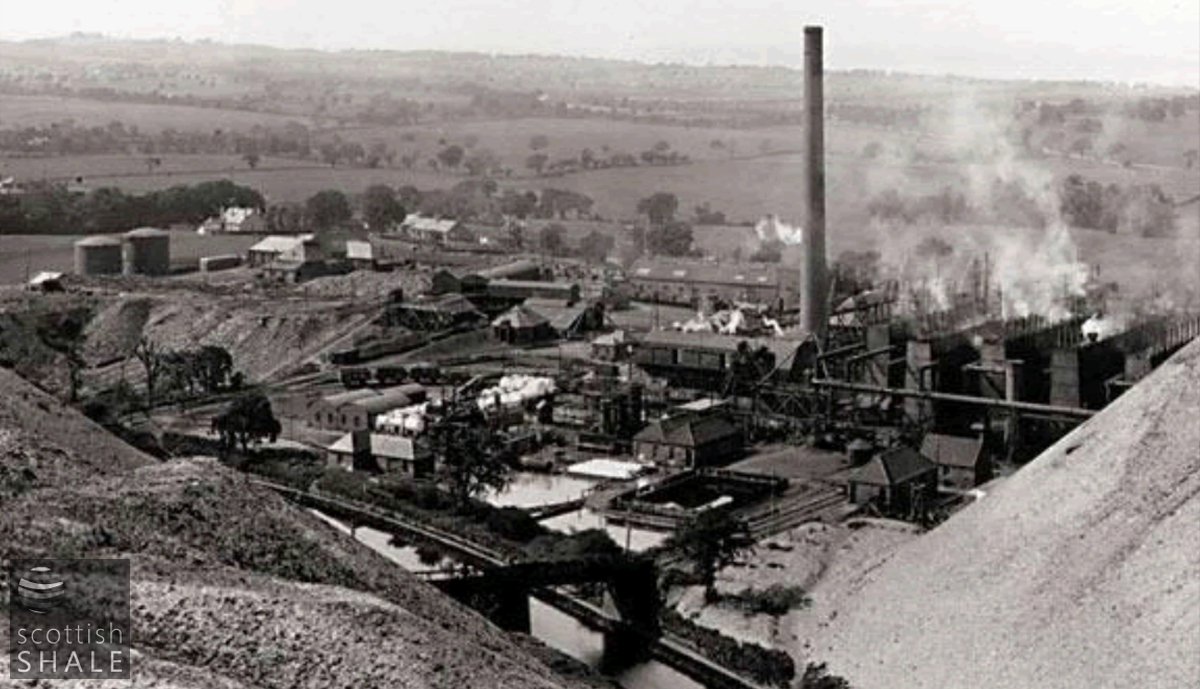
View of oil works from the southern bing; an official Scottish Oils view, photographed c.1925
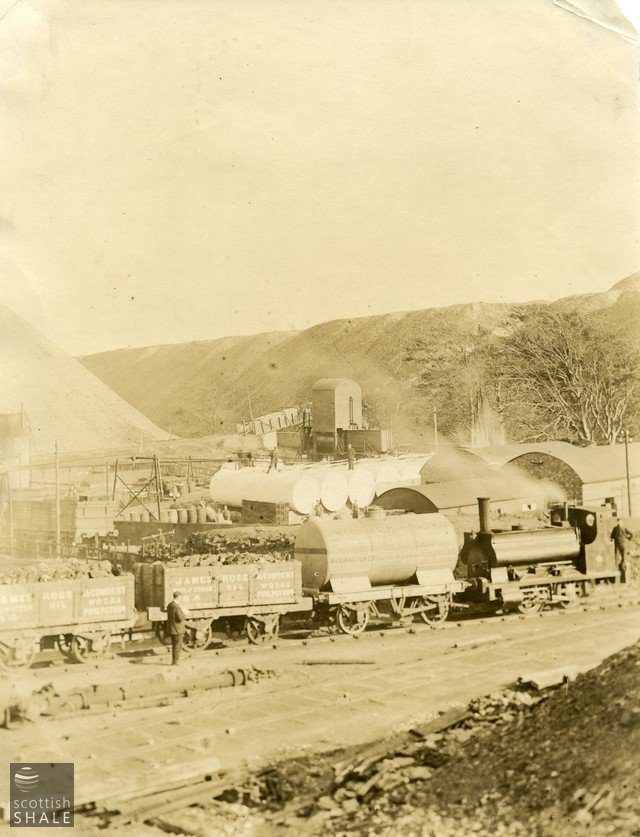
See full record LVSAV1998.033
Recent images

Looking east. June 2011.

Looking north east. June 2011.

Looking north. June 2011.
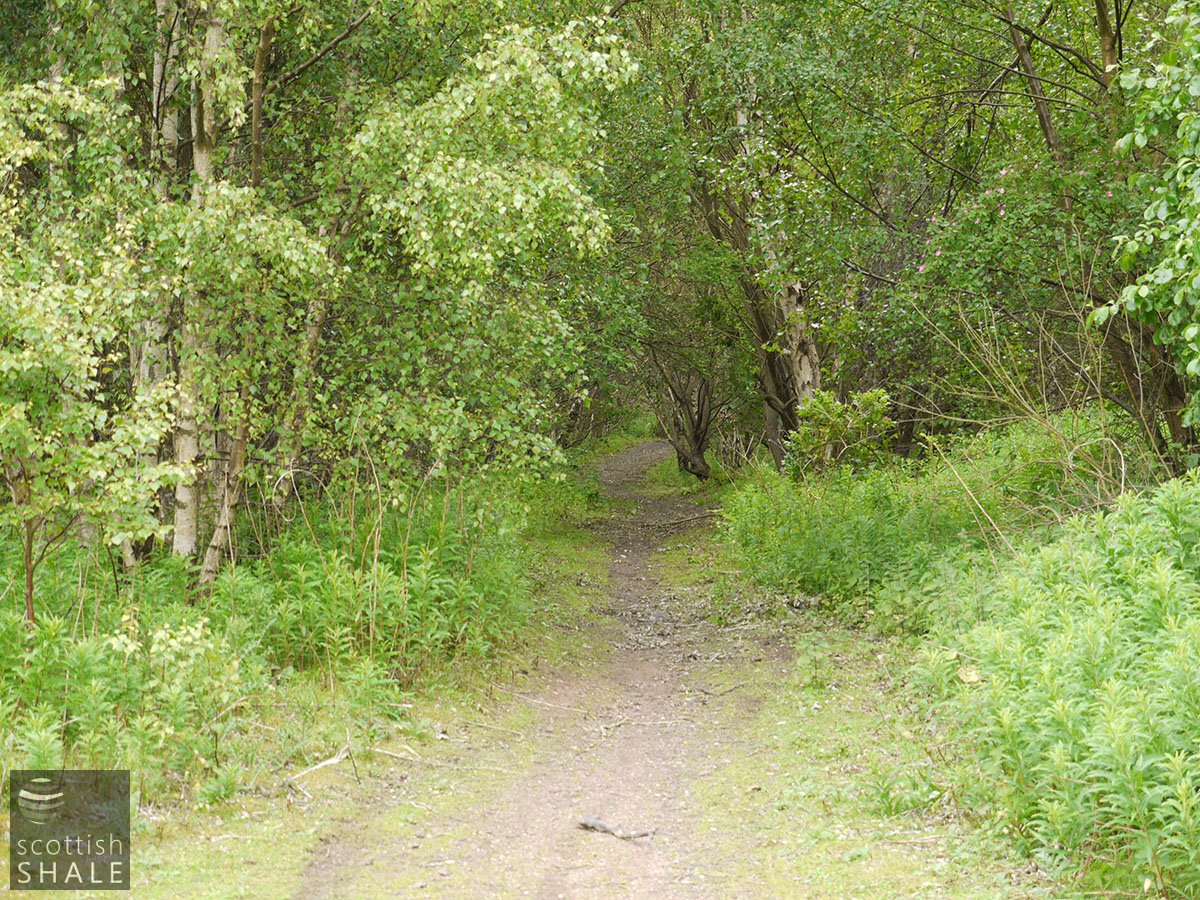
Looking east. June 2011.
A Champfleurie mine to be reopened. It is understood that the No.3 shale mine, formerly worked by the Linlithgow Oil Company (now defunct) is to be re-opened by Messrs James Ross & Co. of Philpston, who some time ago acquired a lease on the minerals which were leased to the Linlithgow Oil Company. The shale for the mine is to be conveyed to the retorts at Philpston Oil Works, and it is understood that it is with that object in view, Messrs Ross & Company are constructing a railway crossing on the public road, to the south of Bridgend Rows.
Linlithgowshire Gazette, 17th January 1908
.......
PHILPSTOUN OIL WORKS
We understand that Messrs James Ross and Co. propose the erection of additional retort plant at their works at Philpstoun, and that with this view the "foonds" are now being prepared. This will no doubt mean the employment of many more hands and it may be – as many hope it is – the forerunner of the refinery, in regard to the building of which a good deal has been held from time to time.
Linlithgowshire Gazette, 21st April 1911
.......
BLAZE AT PHILPSTOUN OIL WORKS
Excitement In The Village - An alarming outbreak of fire occurred at the Philpstoun Oilworks, belonging to Scottish Oils, Ltd. The damage to plant and materials is roughly estimated at several hundred pounds. The origin of the outbreak is unknown. The flames were observed by workmen coming from the Scrubber pump house, and the alarm was raised. All available workmen in the neighbourhood were speedily on the scene, and by means of fire-hose and extinguishers the flames were subdued after an hour's hard work. Considerable excitement prevailed at the works, and among the people of the village.
Evening Telegraph, 23rd June 1926
.......
DISMANTLING OIL WORKS
Seafield and Philpstoun - The directors of Scottish Oils (Ltd) have decided to dismantle other [sic.] two of the oil works in West Lothian, which have been stopped since last summer. Seafield Works had a retorting plant and were used for the manufacture of crude oil, which then passed on to Pumpherston to be refined. The Seafield Works gave employment to several hundred men, and the village was entirely dependent on the oil trade. With the demolition of the works the last hope has expired of the men over getting employment again locally. The Oil Company gave the workmen a very fine institute and a bowling green, and these are being found useful by the men during their enforced idleness. At Philpstoun also orders have been given that the oil works and plant at the shale mines are to be dismantled. Philpstoun village also depended on the oil industry, and workmen have had to live on unemployment benefit since the works closed.
Scotsman, 12th May 1932



